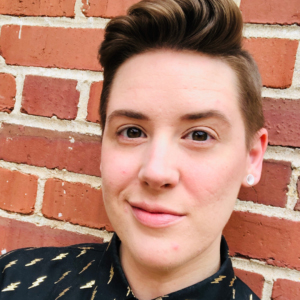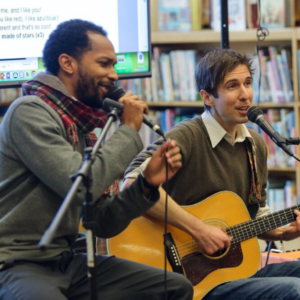 Equity in Action Grant: Pushing for Progress in our Communities
Equity in Action Grant: Pushing for Progress in our Communities
INAUGURAL EQUITY IN ACTION GRANTEE
After the Diversity Training: Supporting & Sustaining Instructional Fidelity in the Culturally Responsive Classroom
Penn Pritchard, Curriculum and Instructional Leader, AIM Academy
How do we bridge the gap between professional development offerings and the meaningful, ongoing translation of theory and research into innovative curriculum planning and inclusive pedagogy? In this session, learn how one instructional leadership team is developing fidelity tools to formally establish and define cultural competency as a critical instructional component, describe ideal implementation at the practitioner level, and offer school leaders a framework with which to strategically document observable teacher behaviors and deepen emerging proficiencies. Participants in this workshop will gain familiarity with assessment tools and implementation strategies, engage in self-reflection to identify their own personal and institutional strengths and growth areas in this realm, and work collaboratively to explore the potential impact of instructional fidelity frameworks on their respective classrooms and school communities.
 Penn Pritchard (they/them/theirs) is a Curriculum and Instructional Leader at AIM Academy, where they have been a faculty member since 2009. Currently, Penn sits on the Head's Committee for Diversity, Equity, and Inclusion, and also regularly designs and implements equity-related programming for both students and staff. Penn has presented on the topics of equity, inclusion, identity, and evidence-based instruction for students who learn differently at a variety of regional and national events.
Penn Pritchard (they/them/theirs) is a Curriculum and Instructional Leader at AIM Academy, where they have been a faculty member since 2009. Currently, Penn sits on the Head's Committee for Diversity, Equity, and Inclusion, and also regularly designs and implements equity-related programming for both students and staff. Penn has presented on the topics of equity, inclusion, identity, and evidence-based instruction for students who learn differently at a variety of regional and national events.
Engaging Math Students With Civics and Social Justice
João Gomes, Upper School Math Teacher, Upper School Coordinator of Equity & Inclusion, The Agnes Irwin School
Structural inequality is the result of a process that cannot be fully understood without mathematics. Core math classes already cover the topics needed to explore civics and social justice, but rarely do these classes include problems that explicitly explore these themes. At the same time, math teachers often discuss the need for more engaging applications to help students develop a mathematical lens through which to view the world. This workshop will explore justifications for including problems centered around social justice and civic engagement and help teachers get started by providing them with a database of such problems arranged by algebra topic. Students can tell when something is/not important to a school. When topics centered around equity and inclusion are absent from STEM classes or relegated to senior electives for students who have fallen below grade-level, it sends a clear message to everyone in the community. If schools want to show that DEI issues are important, they must find ways to infuse the core curriculum with relevant topics that help students explore America's past and present as we prepare them to lead in the future. Participants will come away with helpful tips and a framework to help them engage with others in their community (including faculty, parents, administrators, and boards) about adding social justice topics to core math classes. They will also be given access to a database of social justice applications, arranged by algebra topic. This will allow participants to hit the ground running when they return to their schools and start the work of creating a more meaningful and transformative math curriculum.
 João Gomes was born in Lisbon, Portugal and raised in New Jersey. He earned a BS in Mathematics & Computer Science from Fairfield University and an M.S.Ed. in Education, Culture, & Society from the University of Pennsylvania. João has worked at independent boarding and day schools in New York, New Jersey, Texas, and now Pennsylvania. He teaches high school Mathematics at The Agnes Irwin School in Bryn Mawr where he is also the Upper School Coordinator of Equity & Inclusion. A SEED trained facilitator, João leads a SEED program for Agnes Irwin parents and board members.
João Gomes was born in Lisbon, Portugal and raised in New Jersey. He earned a BS in Mathematics & Computer Science from Fairfield University and an M.S.Ed. in Education, Culture, & Society from the University of Pennsylvania. João has worked at independent boarding and day schools in New York, New Jersey, Texas, and now Pennsylvania. He teaches high school Mathematics at The Agnes Irwin School in Bryn Mawr where he is also the Upper School Coordinator of Equity & Inclusion. A SEED trained facilitator, João leads a SEED program for Agnes Irwin parents and board members.
Upstream: Songs for Building Equitable, Just, and Loving Community in Preschool-3rd Grade Classrooms
City Love - Dwight Dunston (Sterling Duns), Coordinator of Equity and Justice Education, Friends Central School; and Brian Caselli Jordan, Educator/Musician, The Philadelphia School
"Nip troubles in the bud; sow the great in the small. Big things of the world can only be tackled by attending to their small beginnings." - Lao Tzu. In order to build the world we need, we must head upstream and begin the work of equity and justice with our youngest learners. In this workshop we will share a participatory sequence of our songs and discuss using them to open up meaningful, developmentally appropriate dialogue and action in the classroom around racial justice, equity, identity, solidarity, self-love, and beloved community in the face of role models demonstrating the opposite. We will end by sharing our creative process and putting it to use in order to make a full group song! Come sing with us!
 City Love is a social justice music and education duo that has shared workshops and assemblies at schools, colleges, and conferences throughout the country for the last five years. City Love spent last year as the Friends in Residence at Haverford College. Besides their extensive work with students in middle school through college, they recently completed an album of young children's music about diversity, equity, and inclusion called, The Future Is Bright which features both local students and experts in the field, Dr. Howard Stevenson, Dr. Ali Michael, and Dr. Peggy McIntosh. City Love's new album seeks to give families, teachers, and children shared language, narratives, and theme songs to open discussions about race, celebrating our differences, self-love, fairness, standing up for each other, and sharing.
City Love is a social justice music and education duo that has shared workshops and assemblies at schools, colleges, and conferences throughout the country for the last five years. City Love spent last year as the Friends in Residence at Haverford College. Besides their extensive work with students in middle school through college, they recently completed an album of young children's music about diversity, equity, and inclusion called, The Future Is Bright which features both local students and experts in the field, Dr. Howard Stevenson, Dr. Ali Michael, and Dr. Peggy McIntosh. City Love's new album seeks to give families, teachers, and children shared language, narratives, and theme songs to open discussions about race, celebrating our differences, self-love, fairness, standing up for each other, and sharing.
